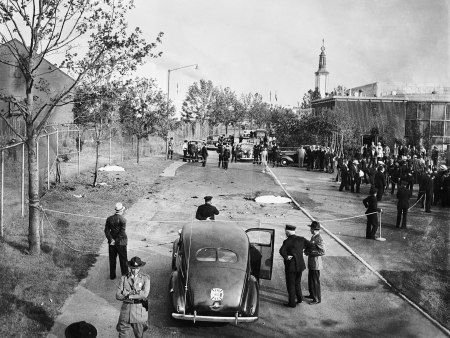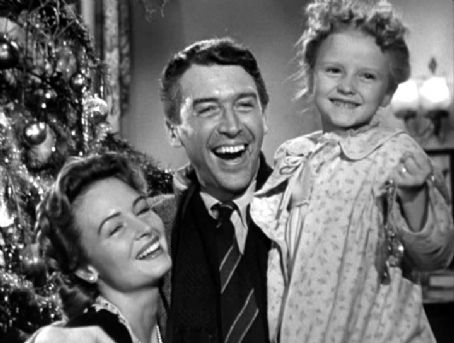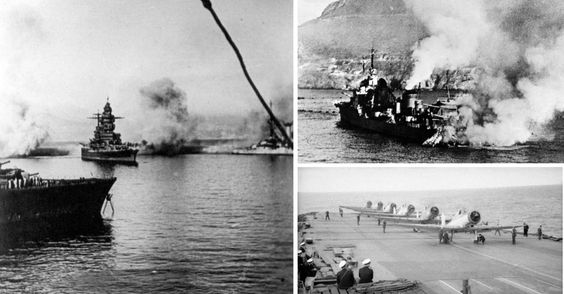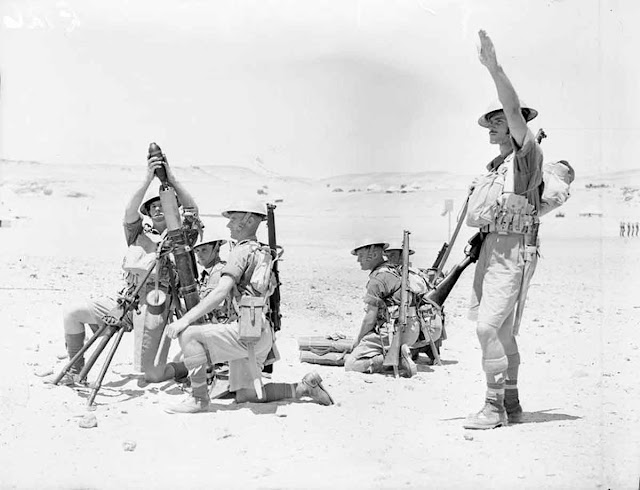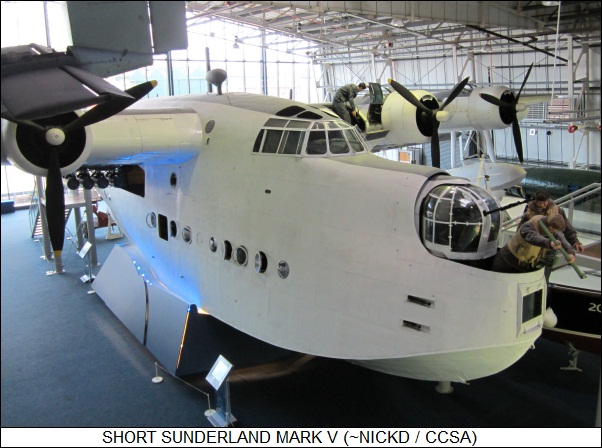Monday 8 July 1940
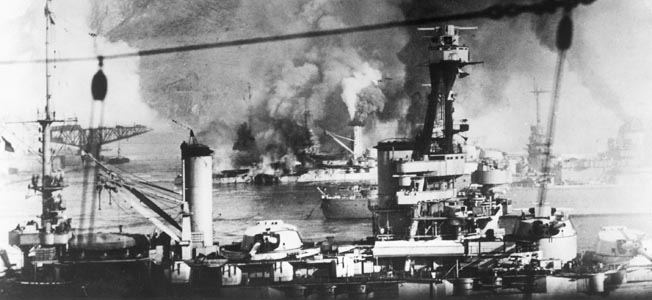 |
| Operation Catapult, July 1940. |
Convoy OA 179 departs from Methil.
Battle of the Mediterranean: Operation Catapult, the neutralization of the French fleet, continues. At Casablanca, British torpedo boats attack the French battleship, Jean Bart. In addition, the British attack Dakar for the second day without inflicting any major damage.
Italian submarine Guglielmo Marconi torpedoes Destroyer HMS Escort in the Western Mediterranean. The destroyer eventually sinks.
Admiral Cunningham in the Mediterranean is running Operation MA5, a convoy from Malta to Alexandria. He has provided massive protection for it, including virtually all of the Royal Navy forces in the Mediterranean. The Italian Navy under Admiral Campioni also is running an operation in the same general area covering a convoy to Benghazi. The British learn of the Italian operation and break off their own, but proceed to positions in the general vicinity of Taranto to intercept the Italians when they return to Italy. The Italians complete their own convoy and then learn of the British fleet presence. They arrange their own dispositions for possible fleet action. These are the preliminary stages of the Battle of Punta Stilo.
Force H under Admiral James Somerville, led by battlecruiser Hood and aircraft carrier Ark Royal, leaves Gibraltar to help cover the big Malta-Alexandria convoy and related operations.
At Malta, quarrymen dig out 30 new rock shelters near Luqa aerodrome. There are international press reports about recent raids on the island. There is an attempted raid at 14:20, but defending RAF fighters disperse it before it reaches the coast.
 |
| Aircraft carrier HMS Hermes off Dakar during a convoy run. In the background, HMS Dorsetshire. |
The fighter forces "mix it up" during the day, and the Luftwaffe shoots down 3 Spitfires and two Hurricanes. JG51 gets the kills.
Lt. Johann Bohm of 4./JG51 is forced down after being damaged in combat. He lands at Bladbean Hill, Elham, Kent. This gives the British a good Bf 109E to study and is the first largely undamaged Bf 109 to land in Great Britain. Coincidentally, later in the day another Bf 109E also lands later in the day at Sandwich, Kent, flown by Lt. A. Striberny of 3(J)./LG 2. This one is a Bf 109E-3. The British learn that there is heavier armor plating in the cockpit area on this series of aircraft.
Twin-engine Bf 110 Zerstorers are being used as fighter-bombers. A flight of them crosses the English coast at Dungeness and is intercepted by Spitfires from No. 54 Squadron. An escorting formation of Bf 109s then gets involved and shoots down two Spitfires and damages another.
Heinkel 111s of III./KG 54 attack industrial targets at Bristol.
RAF bombers attack Kiel, where heavy cruiser “Lützow” is being repaired following torpedo damage. A bomb hits the Lützow but fails to explode. They also raid Ostend, hitting a German supply ship, and also damage port infrastructure. The priority of RAF Bomber Command is shifting to the barges in canals in places like Zwolle, Haten, Weest, Elberg, and Deft.
RAF Fighter Command forms No. 10 Group for the defense of southwest England.
German/Swedish Relations: The governments sign a formal agreement permitting Wehrmacht troop and supplies transit on the Narvik railway under certain circumstances.
British/Swedish Relations: The British lodge a formal protest about the decision by Stockholm to allow German military transit on the Narvik railway.
Soviet/Finnish Relations: The Soviets demand transit privileges across Finnish territory to their base at Hango.
Soviet Military: The Soviets establish a Danube Flotilla on the territory they have occupied in Romania.
Swiss Military: The Swiss government mobilizes its army and allocates them to three Alpine fortresses. The Swiss have gotten wind of a German desk planning exercise, Operation Tannenbaum, the invasion of Switzerland. Hitler has some sort of grudge against Switzerland which leads to violent outbursts among his staff.
Japanese Military: The Imperial Japanese Navy launches battleship Yamato. Yamato has the largest guns in the world.
French Government: Free French leader Charles de Gaulle makes a BBC address in which he criticizes the British for their attacks on the French fleet, saying "all Frenchmen are dismayed."
The Vichy French prepare to withdraw their ambassador to the Court of St. James in London.
British Government: The nine divisions recovered from France are reorganized to face a possible invasion.
Norwegian Government: King Haakon refuses a request made by the German-controlled Storting (legislature) that he abdicate.
US Government: The US Joint War Planning Committee examines possibilities for the French island of Martinique in the Caribbean. The tentative plan is to send the US 1st Marine Brigade from New York to invade it.
British Homefront: Tea rationing begins, with 2 oz. per person per week. This is a big deal in the British Isles, with many extravagant literary expressions of calamity. This is a subtle but telling indication that the U-boat menace is real and growing.
 |
| The Republican ticket, Newsweek, 8 July 1940. |
July 1940
July 1, 1940: Vichy France
July 2, 1940: Arandora Star
July 3, 1940: Operation Catapult at Mers El Kébir
July 4, 1940: Romania In Crisis
July 5, 1940: The Five Freedoms
July 6, 1940: Hitler's High Point
July 7 1940: Dakar And Ringo
July 8, 1940: Tea Rationing in England
July 9, 1940: Battle of Calabria
July 10, 1940: Battle of Britain Begins
July 11, 1940: "Nous, Philippe Petain"
July 12, 1940: Enter Laval
July 13, 1940: German Surface Raiders Attack!
July 14, 1940: Bastille/Mourning Day
July 15, 1940: Tallest Man Dies
July 16, 1940: Plans for Sea Lion
July 17, 1940: Burma Road Closed
July 18, 1940: FDR Runs Again
July 19, 1940: Last Appeal To Reason
July 20, 1940: First Night Fighter Victory
July 21, 1940: Soviets Absorb Baltic States
July 22, 1940: First RAF Night Fighter Victory
July 23, 1940: Invasion False Alarm
July 24, 1940: The Meknés Incident
July 25, 1940: Black Thursday for RAF
July 26, 1940: Capture The Duke?
July 27, 1940: What's Up, Doc?
July 28, 1940: Destroyers Pulled From Dover
July 29, 1940: Barbarossa On The Burner
July 30, 1940: Hitler Delays Sealion
July 31, 1940: Bloody Wednesday of Olkusz
2020
